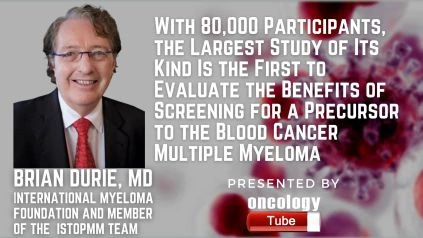Brian Durie, MD, part of the iStopMM team and chairman of the International Myeloma Foundation speaks about the study – With 80,000 Participants, the Largest Study of Its Kind Is the First to Evaluate the Benefits of Screening for a Precursor to the Blood Cancer Multiple Myeloma.
According to the International Myeloma Foundation, findings published this week in Blood Cancer Journal might lead to a paradigm change in myeloma therapy, including screening for the disease’s precursor and early treatment.
With a total of 80,759 participants, the IMF-funded iStopMM research (Iceland Screens, Treats, or Prevents Multiple Myeloma) is the biggest of its type.
Multiple myeloma is a malignancy of the bone marrow plasma cells that is invariably preceded by MGUS, a disorder in which an aberrant protein emerges in the blood. Asymptomatic people are not routinely screened for this blood cancer precursor by doctors. The iStopMM research compares the possible advantages of MGUS screening to the possible risks.
In November 2016, the iStopMM team formally started their ambitious attempt in Iceland to enroll at least 70,000 people over the age of 40. The appeal for volunteers was accentuated by the country’s size, its residents’ service-oriented ethos, national leaders’ support, and a splashy social media campaign.
Large-scale demographic studies are nothing new in Iceland. Last year, Iceland’s health officials teamed up with deCode Genetics, a Reykjavik-based business working on genetic research with the iStopMM project, to screen more than half of the country’s 368,000 citizens for COVID-19 infection.

